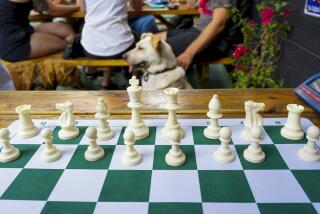Soviet Chess Unknown’s End Game Wins Freedom in Utah : Russia: Igor Ivanov’s 1979 defeat of Anatoly Karpov sparked a circuitous escape to the West. Even after hundreds of tournaments and thousands of games, he is primarily known for that one unlikely triumph.
- Share via
SANDY, Utah — It’s been 16 years since Igor Ivanov, then a virtual unknown in the chess world, defeated World Champion Anatoly Karpov.
But Ivanov’s memories of the stunning upset are in mint condition.
For The Game was the essential link in Ivanov’s circuitous, boy-to-man odyssey from the rubble of post-World War II Leningrad in the Soviet Union to a home in the exclusive foothills of northern Utah’s Wasatch Mountains.
Today, chess remains the focus of Ivanov’s life, as both player and teacher. One of his students, Brian Harrow, is among the top 15-year-old players in the country.
The Game in 1979 proved to be Ivanov’s ticket to freedom in the West. It also nicked Karpov’s reputation for indestructibility during a 10-year reign atop the Game of Kings. Even after hundreds of tournaments and thousands of games, Ivanov is known primarily for that one unlikely triumph. The reputation persists because Karpov remains among the world’s best players.
*
“It turned out to be an extremely important game,” Ivanov said with a smile, caressing a pawn from the polished wooden set in front of him. “Karpov, at the time, was almost invincible. His prestige was sky-high. He had meetings with [Leonid] Brezhnev, the head of state at the time. It was fascinating.
“He’d come back from a brilliant victory in Montreal. Everybody expected I couldn’t stand against him. Everyone was fearful of him.”
For five years, Ivanov--secretly planning to defect--had unsuccessfully petitioned the Soviet chess Establishment for selection to compete abroad. But the master-class player from Leningrad, an orphan at 14 who attended the state-run Pioneer Palace chess school, wasn’t considered good enough.
Then came the inter-Republic team tournament in Moscow, where Ivanov found himself paired in the first round against the world’s top grandmaster.
The nervous underdog pushed his white king’s pawn forward two squares to begin an assault on Karpov’s renowned Sicilian Defense. Hours later, the game was at a critical crossroads.
“There was an opportunity where he could put my king in perpetual check, forcing a draw,” Ivanov said. “For the 15 minutes he was thinking, I was praying, ‘Please, please, take the draw.’ ”
But Karpov, still confident he could overcome a player ranked several hundred points below him, tried for victory. It was the wrong decision. The champion’s position deteriorated and, after an overnight adjournment, Karpov surrendered.
*
For Karpov, the loss was a rare sour note. He continued to rule the chess world through 1985, then regained the World Chess Federation title in 1993 after Garry Kasparov vacated it.
But for Ivanov, the door had been opened. He literally ran through it--a bare half-step ahead of his KGB handler.
Competing in a tournament in Cuba in 1980, Ivanov asked a German player to write a note for him, in English and French, explaining he was seeking political asylum. An American promised to notify U.S. authorities.
Apparently, though, Soviet authorities also learned of Ivanov’s intention. When the team’s Aeroflot jet left Cuba, he was moved into first-class and was carefully watched by “this nice guy who sat behind me.”
“I knew then that I couldn’t go back to Moscow,” Ivanov said.
During a refueling stop in Newfoundland, Ivanov managed to pass his note to a store clerk, who then handed it to a Canadian policeman. When Ivanov walked up to the officer, pandemonium erupted.
“[The KGB agent] ran and tried to trap me physically [but] when he approached and jumped, I ran, so he jumped into the policeman,” Ivanov said, laughing. “It was like a movie.”
While his Soviet minder and the officer scuffled, Ivanov streaked through the door onto Canadian soil.
“I was so much fun, it was unbelievable,” he said. “But I ended up in the bathroom right away; it was too much for my nerves. That part wasn’t fun.”
Angry Soviet officials rifled his luggage, confiscating his treasured chess books and game scores and leaving him only his clothing to start a new life. It proved enough. A year later, Ivanov won the Canadian championship, and went on to be the undisputed king of America’s Grand Prix of Chess competition. He won the grueling tournament circuit a record eight years between 1982 and 1990.
In 1984, Ivanov met a schoolteacher, Elizabeth, at a Los Angeles tournament, and they were married two years later. He became a Southern California resident, then moved to Utah, where his wife had taught for 24 years.
Now 48, Ivanov is listed 45th on the U.S. Federation’s top 50 chess players with a rating of 2526. An international master, one step shy of grandmaster, he tied for first in the 1992 National Open with the likes of GMs Gregory Kaidanov and John Fedorowicz.
His triumph in the Utah Closed Tournament earlier this year gave him the state championship. He followed that by sharing second place in the National Open, held in Las Vegas in June.
After 15 years as an expatriate, Ivanov, now a Canadian citizen, feels the lure of Mother Russia. But his homeland’s increasing crime, and his own long-nurtured fears of reprisal, keep him away.
“I would love to go and see the streets of Leningrad, to visit my mother’s grave. But the answer would be no. It’s too dangerous,” he said. “The KGB is still around.”
More to Read
Go beyond the scoreboard
Get the latest on L.A.'s teams in the daily Sports Report newsletter.
You may occasionally receive promotional content from the Los Angeles Times.










